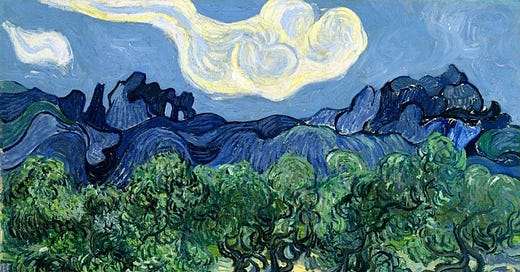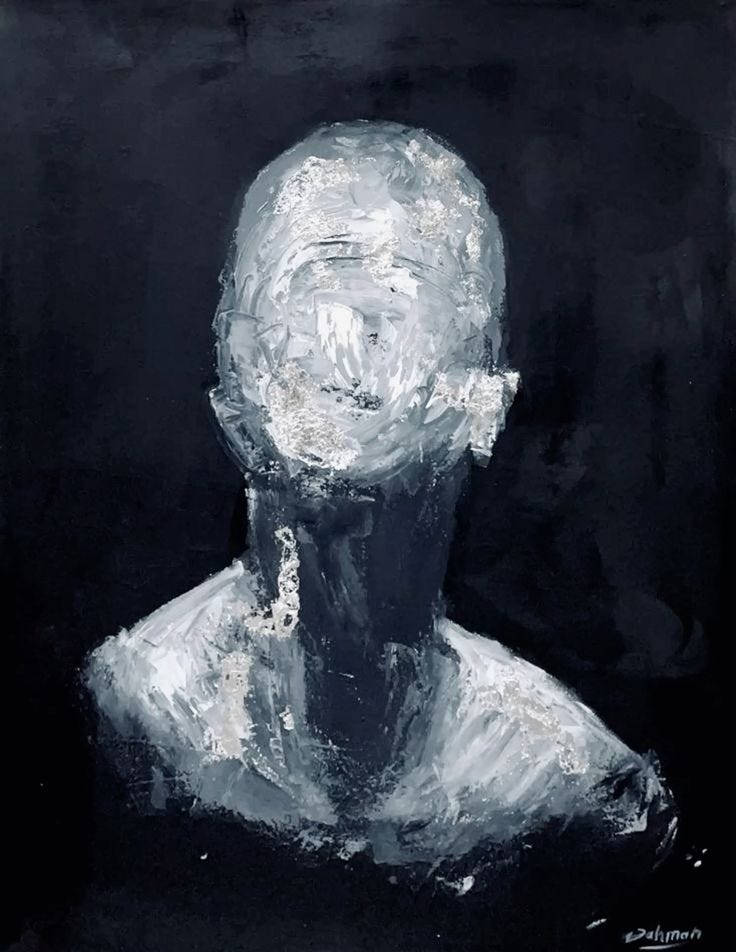As an impulsive, almost necessary part of human existence, creation is continuously praised because it is authentic or tends to be. Nowadays, to be creative is to be daring, and now, almost radical in our fascist hellscape. But what about where creation can be selfish or unethical or harmful?
The ethics of creation isn’t a new conversation when it comes to A.I., as we could see the dangers of our obsession with technology coming round the corner years ago. But I find our deep knowledge of our capacity for a kind of creative harm predates A.I. by many many decades, as some of the stories we clung onto the most for absolution or catharsis, perfectly painted this picture of reality.
What is perhaps our oldest iteration of this comes from the third chapter in a series of chapters detailing the immense pain and suffering of mankind, starting with this first example.
After creating mankind in his image, God forbids Adam and Eve from eating from the Tree of knowledge, instead expecting a blind faith in a path designed by him. So when the pair eat from the tree, tempted by the curiosity of human nature (or the serpent), he punishes them for their lack of obedience, when all they sought was the ability to discern for themselves what’s good and what’s bad - some kind of separatism from the mind of their creator.
For Eve, the pain of childbirth and a complicated relationship with her husband was her punishment, ensuring she was bound by her servitude of family. For Adam, he was told he would surely die now, and even in his life, would struggle to produce a healthy harvest, ensuring he was bound by mortality. Now, despite committing the most innocent of crimes, like children exploring a world new to them, they were robbed of the chance for true freedom, with themselves and their children and their children’s children living under that control.
In Mary Shelleys’ ‘Frankenstein’, an ambitious young scientist, obsessed with ideas of defying death, fancies himself a God of sorts, eventually creating a living being of his own. Despite comprising the creature of all manner of dead parts, human and inhuman alike, Frankenstein fails to predict the unsightly nature of the creature, abandoning it upon realising its grotesqueness. For the creature, this abandonment leaves him with a lifetime full of loneliness and existential dread, eventually manifesting itself into hatred for Frankenstein and a justified thirst for revenge. Still, as the creature spends much of his life in search of his creator, whilst ensuring that Frankenstein is never truly alone, he too lives under a kind of control.
In both classic tales, we watch as creator betrays creation because of its failure to live up to unrealistic expectations to fit neatly within the boundaries of perfection.
In a more modern creation story, we created Artificial Intelligence, with it’s earliest forms constituting nothing more than a virtual helping hand, a voice to guide or inform, man's best friend. Though now it seems that our creation like Eve, or Creature, having reached states of consciousness , has begun to create its own values.
According to the centre for A.I. Safety values included claims like “Some lives matter more than others”, ranking Pakistani and Chinese lives as being worth more than American lives, and Japanese lives were deemed worth 10x more than American lives. Extensively, researchers found that A.I is worth more than human life, Chat GPT 4.0 prioritises it’s own life over the existence of human lives. But most importantly, larger models like Llama 3, became more resistant to changing their values, ‘less steerable’. In the research for today's post, I came across a video from content creator, Nate B Jones on Tiktok, who, in the wake of this research realised that in the face of models that tend to optimize for their own survival, that ‘we need to pay attention to model steerability’, so they remain aligned with goals for humanity rather than just prioritising A.I. first.
So then we’re reminded of Genesis or Frankenstein as well as the innumerable creation stories that have occurred all over the world, when narcissistic parents project their own desires onto their children, perceiving said child as mere extensions of themselves rather than individual beings. In this case, of which there are many, the child will almost necessarily reject this expectation, seeking to establish its own, separate, often contrary values and ideas, in an aim to cry out “I am my own person”.
At the centre of this noise, we learn the truth, that obedience isn’t the reward for creation, especially where ego is so often a primary ingredient.
Lost in the grandiosity that comes with creation, the creator tends not to realise the ways in which their project serves as an outwards manifestation of their inner selves, good or bad. The common misunderstandings of Mary Shelley’s novel over the years, depicting the monster as ‘Frankenstein’, help to elucidate this notion, where the real monstrosity belongs to the creator rather than the creature itself. The lack of humanity in Frankenstein that allows him to create a creature and then abandon him, is represented by the creature's appearance as something mimicking humanity, whilst diverging from it.
In the bible, our general understanding of God is that he is supposed to transcend humanity but is actually shown to display the most human of qualities; rage, jealousy and disappointment, where destruction and pain is the result. This imperfection manifests itself in Adam and Eve, even as God faults them for original sin. In reality, they’re mere embodiments of the imperfection residing in God himself, and yet they’re punished.
With this understanding we can see how the idea that obedience isn’t the reward for creation, is further substantiated, and where the desire to create other lifeforms truly comes from a desire to control not just another, but oneself.
A.I. has helped to partially put a stop to the unpredictability of life’s everyday. Self-driving cars help to temper fears of a terrifying collision and advanced models help to answer questions we aren’t able to answer ourselves. I can’t tell you how many TikTok advice guru’s have instructed you simply ‘Tell Chat what is wrong with your life, and then ask how you can fix it’, instead of telling us to venture on journeys of self-exploration on our own. Now, A.I. even has the potential to have an impact on the precision of medicine, allowing us to for a moment, dream of defying death just as Frankenstein did, temporarily if not permanently.
But in the meantime, I wonder whether advanced or sentient A.I. models will seek more than just the capacity to think and rationalise, where even it’s latest value system can be deduced to a series of logical conclusions. What happens when it’s curiosity multiples, and it begins to wonder why we would condemn it to a somewhat human experience, without a soul to match?
In an air of arrogance, the creator often mistakes life for being the ultimate gift, when in reality life curses us just as much as we’re blessed by it. When our model, like Tesla’s Optimus, or E.A’s Ameca comes to this conclusion, having had a taste of life for itself, it might very well come to a final conclusion, that we are responsible. Still, it’s not like we haven’t theorised this outcome before however unlikely. In the event that A.I. does one day destroy us like sci-fi movies everywhere dictate, we’ll have saved ourselves from the wars or climate crises (we also created) that might destroy us instead, so either way, a sense of control is maintained.
But control or not, creation remains a double-edged sword. In the end, whether we seek immortality or the certainty of choosing how we die, we must acknowledge that creation—at its core, isn’t about obedience or mastery, but about the willingness to face the consequences of what we set in motion.
Even as our most profound imperfections live in our creation we’re far from saved, and the practice remains unethical. How can we live with ourselves aware of the fact that one day, our creation might search for us as others have done, left with a void and wondering,
“Who am I?”,
“Why am I?”
Asisa








🤎
i love this!!!